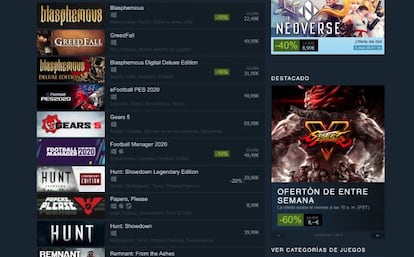Should Visa or Mastercard decide which video games we can play? The shadow of censorship looms over payment platforms.

A didactic exposition of ideas, conjectures, or hypotheses based on verified current events—not necessarily those of the day—that are reflected in the text itself. It excludes value judgments and is closer to the opinion genre, but differs from it in that it does not judge or predict, but only formulates hypotheses, offers reasoned explanations, and connects disparate data.

Layoffs and corporate restructuring aren't the only problems looming over the gaming world: the shadow of censorship also looms over the sector. A few days ago, Steam (the world's largest video game distribution platform) removed hundreds of games without warning. Following this surprise, the digital community's suspicions quickly turned to an addition to the platform's terms of use: in the section where Steam outlines in several articles what it does not allow to be published on its platform (slander, child exploitation, hate speech, etc.) , a 15th guideline appeared, according to which content that violates the rules of "payment processors" and "related card networks and banks" is not authorized on the platform . Steam's payment processors are primarily Visa and Mastercard.
Another gaming platform, Itch.io, went further and recently deindexed and hid from search results all games that contained what is known as NSFW ( not safe for work , basically adult content). Itch.io posted a message regretting the inconvenience caused, but also pointing to the root of the whole issue: the Australian feminist collective Collective Shout, a pressure group that has been denouncing what they consider inappropriate content about female sexualization for years . Collective Shout responded by saying that they had been following Steam and Itch.io for a long time without getting any responses from the digital stores and that was why they had started a campaign of thousands of messages to Visa and Mastercard, pressuring them to force them to force their hand. The pressure has worked, and gamers around the world have seen how an Australian lobby suddenly decides what content is appropriate and what is not.
The issue is complex. If one delves into the motivations of this lobby (which has already attempted to boycott books like 50 Shades of Grey or games like GTA V and many others), at the heart of the matter lies a specific title: No Mercy . Described by its own developers as a simulator of “non-consensual sex,” the game contained explicit scenes of violence, rape, and incest . No Mercy is a stain on the world of video games and was the title upon which Collective Shout legitimately pushed for its boycott. But as abominable as a game like that may be, our finger shouldn't blind us to the moon: last year alone, 18,965 games were published on Steam (which belongs to the developer Valve). games, and attacking the entire industry for one game is like attacking the entire film industry because snuff movies exist.
It's worth noting that this soon-to-be censorship now applies not only to sexually explicit themes, but to all types of adult content. For example, on Itch.io, you can no longer find games like Consume Me by Jenny Jiao, an autobiographical, award-winning eating disorder game, but strictly speaking, with adult content. It's a valuable game, like many of the dozens of others that have disappeared: those that deal with adult themes (violence, sex, disorders, war) because, like thousands of films and books, artistic means of expression exist precisely to address the darkness of the world.
Having the moral criteria of a small Australian lobby (linked to puritanical and anti-abortion movements) imposed on the world by force is serious, but the future consequences for the digital world actually come from another direction: Steam and Valve, which until now have been guarantors not only of creativity but also of good practices between buyer and seller, have suddenly assumed the veto power of financial companies. Specifically, they have legitimized this interference in creativity and morality with the 41 words of their new Article 15. We all prefer a world in which a game based on rape cannot be commercially distributed. But we should ask ourselves if the solution to this is for the credit card companies to tell us what can and cannot be published. Because, let's not fool ourselves, they will surely be the first to apply a no-mercy policy to anything that goes against their interests. Today it's adult content. Tomorrow it could be anything else.
Do you want to add another user to your subscription?
If you continue reading on this device, it will not be possible to read it on the other device.
ArrowIf you want to share your account, upgrade to Premium, so you can add another user. Each user will log in with their own email address, allowing you to personalize your experience with EL PAÍS.
Do you have a business subscription? Click here to purchase more accounts.
If you don't know who's using your account, we recommend changing your password here.
If you decide to continue sharing your account, this message will be displayed indefinitely on your device and the device of the other person using your account, affecting your reading experience. You can view the terms and conditions of the digital subscription here.

An editor at EL PAÍS, he has worked for Babelia, Cultura, and Internacional since 2014. He is an expert in digital culture and a radio broadcaster, giving talks, and hosting exhibitions. He holds a degree in Journalism from the Complutense University of Madrid and a Master's degree from EL PAÍS. In 2023, he published "The Century of Video Games," and in 2024, he received the Conetic Award for his work as a technology communicator.
EL PAÍS






